Chicken eggs are one of the most nutritious foods in the world and a staple in any country. But, while everyone is familiar with eggs, there is a lot of misinformation about them. For example, many people don’t know whether an egg is fresh or the difference between fertilized and unfertilized eggs. Below is an article about everything you need to know about chicken eggs, the truths, myths, and much more.
The Difference Between Brown and White Chicken Eggs
Everyone has their preference when it comes to brown or white chicken eggs. For example, the French believe the darker the egg, the better the taste. In fact, they created a breed called the Maran that lays deep chocolate brown eggs. But the truth is, there is no nutritional difference between brown and white eggs unless the feed was supplemented for specialty eggs, like Omega-3.
The color of the shell depends on the breed. Usually, brown eggs come from hens with brown feathers, while hens with white feathers produce white eggs. Furthermore, leaner chicken breeds tend to lay white eggs, and they can handle hot climates. Hens that lay brown eggs are typically larger breeds with thick feathering, making them more suitable to colder temperatures and more susceptible to heat stroke. As a result, most eggs sold in the northern United States are brown, while the southern States sell mostly white eggs.
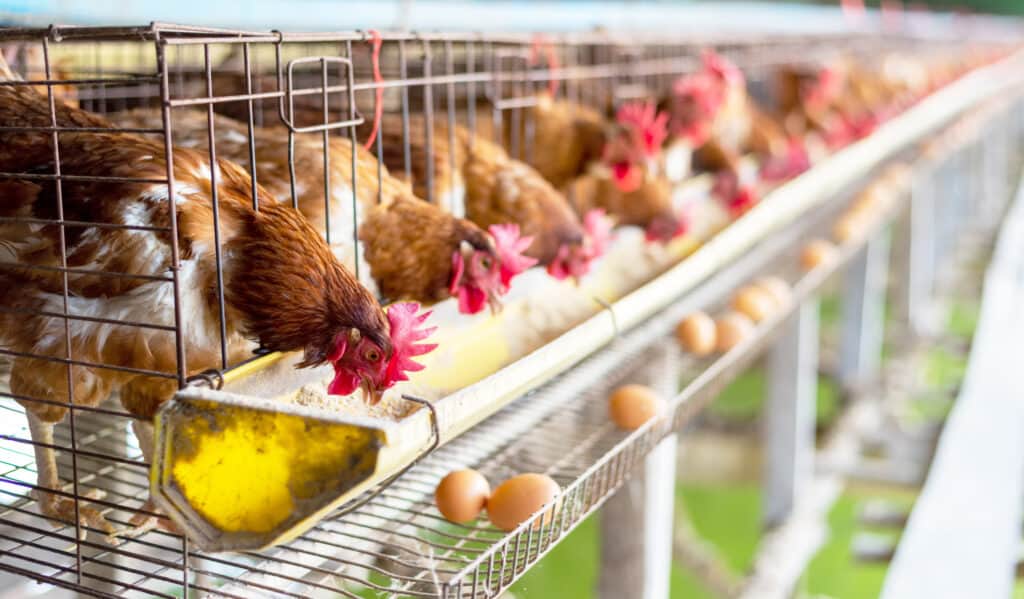
The color of the shell depends on the breed. Usually, brown eggs come from hens with brown feathers, while hens with white feathers produce white eggs.
©SasinTipchai/Shutterstock.com
How Many Chicken Egg Colors Are There?
Due to cross-breeding, there are numerous types of chicken egg colors, like pink, cream, blue, and green. One theory is that chickens bred with pheasants centuries ago, resulting in colorful eggs. While these hybrids are rare, they are possible. Breeds known for blue eggs include Arucauna, Ameraucana, and cream legbars. Furthermore, if any of those breeds are cross-bred with brown-egg layers, the eggs come out green. However, they vary in tint and depth of color.
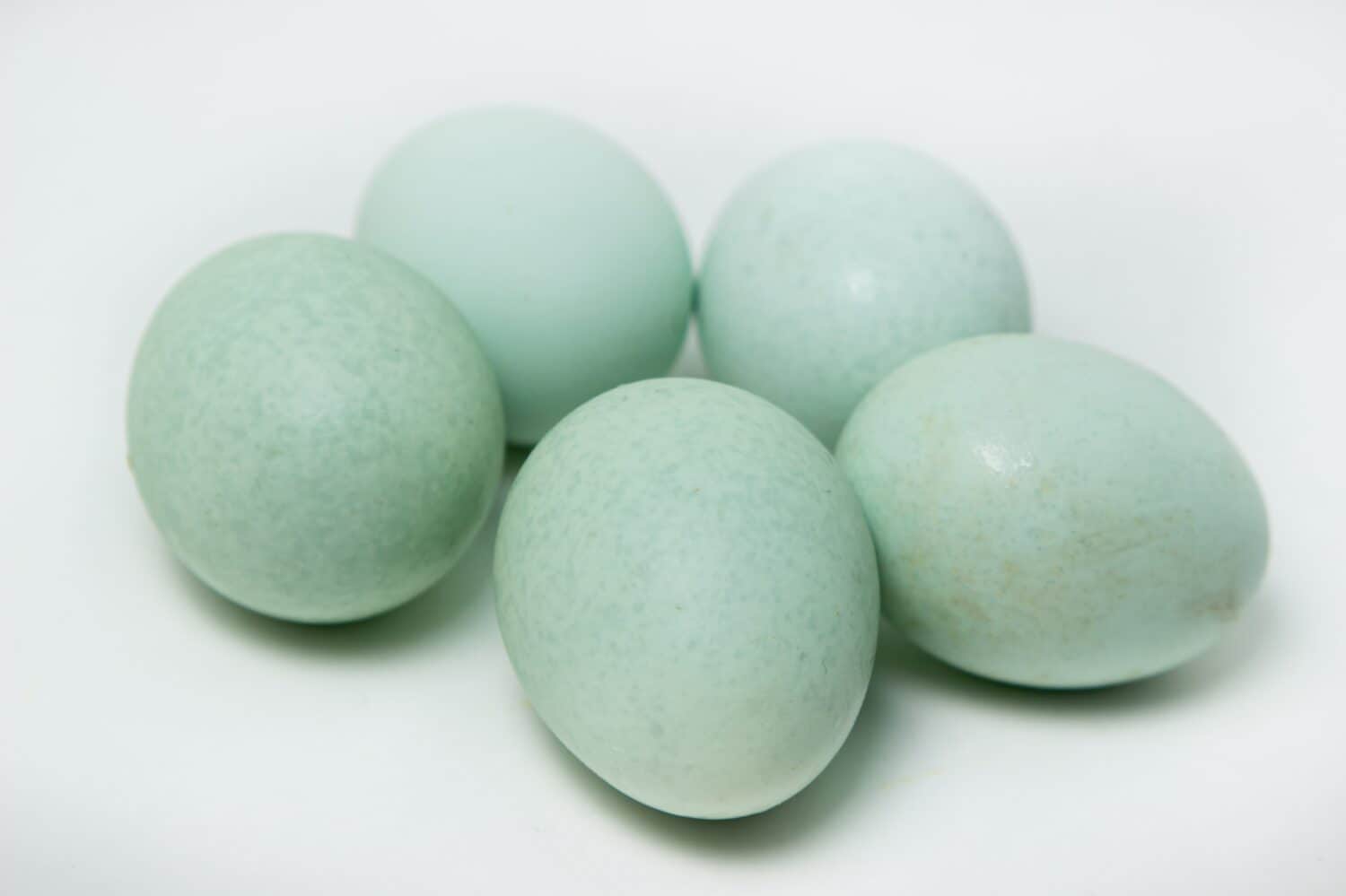
Breeds known for blue eggs include Arucauna, Ameraucana, and cream legbars.
Image: Nerza, Shutterstock
©Nerza/Shutterstock.com
Why Some Egg Yolks Are Orange
It’s normal for an egg yolk to be yellow or deep orange. The only difference between the coloring is based on the hen’s diet. For example, free-range chickens that eat vegetation and insects produce orange yolks, while hens that receive grain feed usually lay eggs with yellow yolks.
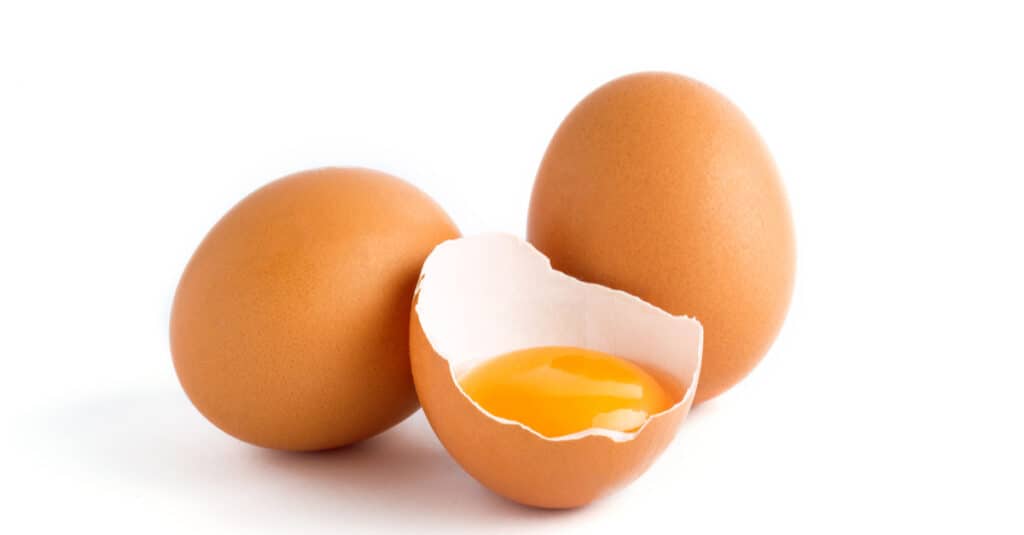
It’s normal for an egg yolk to be yellow or deep orange. The only difference between the coloring is based on the hen’s diet.
©virtu studio/Shutterstock.com
The Difference Between Fertilized and Unfertilized Eggs
Many believe that hens only lay eggs if a rooster is around, but this is untrue. In fact, most eggs from stores are unfertilized. As a result, most commercial egg farmers don’t have any roosters on their farms. However, eggs bought from a farm or farmer’s market might be fertilized, but telling the two apart is relatively easy.
Identifying Fertilized Eggs
Firstly, crack the egg open and examine the yolk. Look for a white spot on the yolk; if you can’t find it, take a spoon and move the yolk around until it appears. If the spot looks like a bull’s eye or donut, it is fertilized, but if it looks like a white dot, it’s unfertilized.
Why Are Some Eggs Bigger Than Others?
Have you ever wondered why there were different-sized eggs? When purchasing chicken eggs at the store, you usually have the option of small, medium, large, x-large, and jumbo. While many believe it has to do with the breed, commercially, it has more to do with the age of the hens.
Big Eggs Come From Older Hens
It’s more likely that an older hen produces larger eggs. For example, Rhode Island Reds are known for laying larger eggs as they get older, so much so that they start laying eggs too big for sale. In fact, the largest chicken egg ever produced weighed a whopping 7 ounces, almost half a pound!
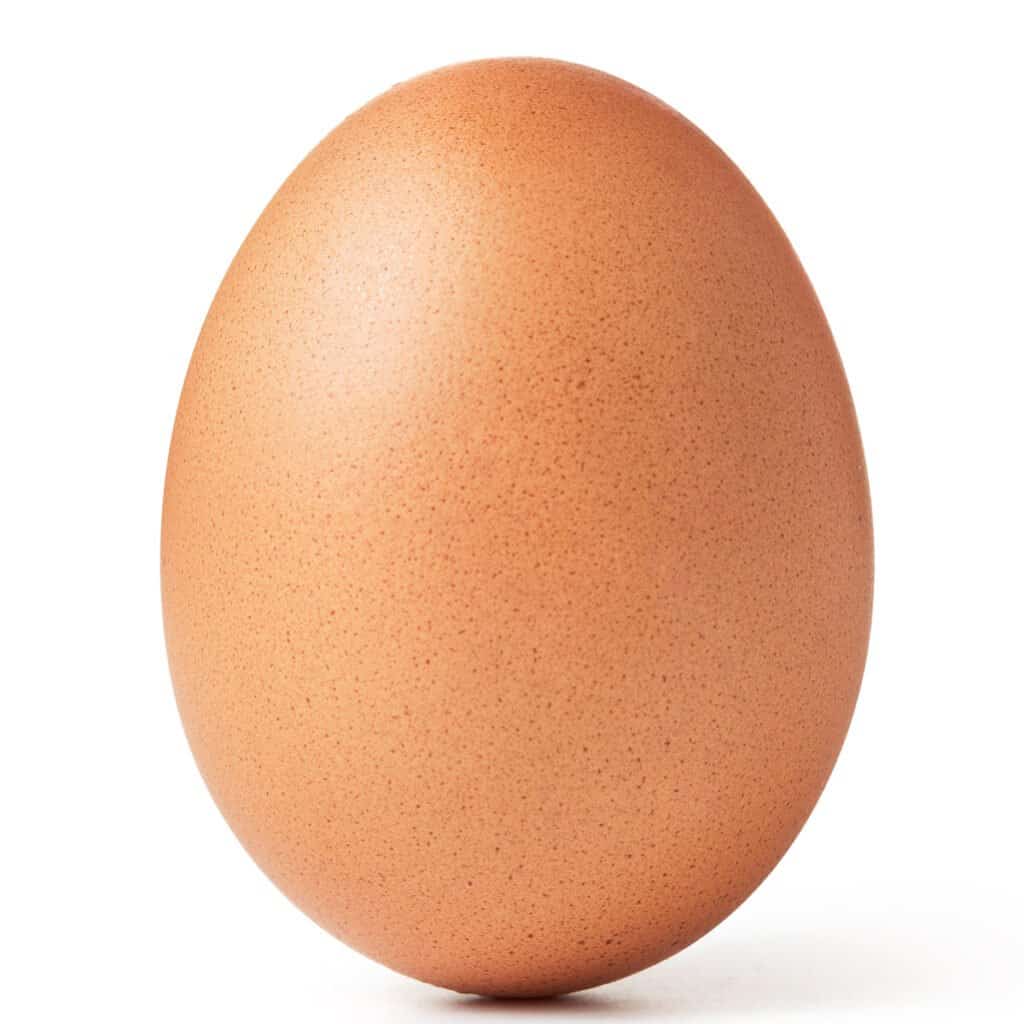
It’s more likely that an older hen produces larger eggs. For example, Rhode Island Reds are known for laying larger eggs as they get older, so much so that they start laying eggs too big for sale.
©Pineapple studio/Shutterstock.com
Small Eggs Come From Smaller Chickens
The smallest chicken eggs you see in stores result from smaller breeds, like bantams. While these chickens can lay just as many eggs as other breeds, their eggs are considerably smaller in size. Seramas (the smallest chicken breed in the world) also lay small eggs. In comparison, their eggs weigh around 0.9 ounces, while regular store-bought eggs weigh about 3 ounces.
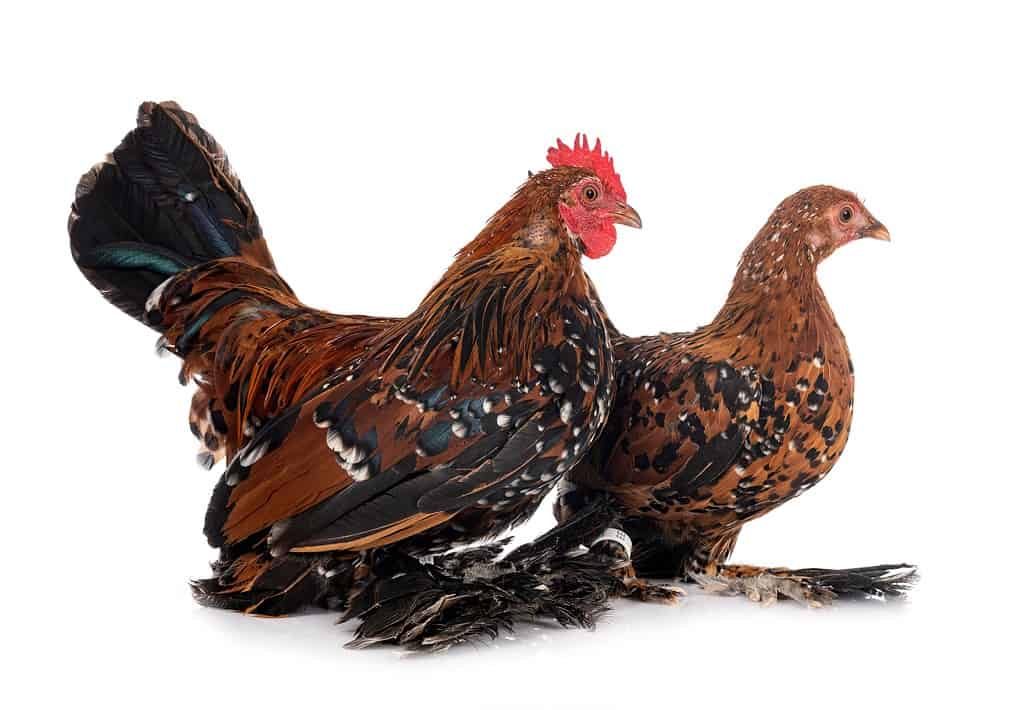
The smallest chicken eggs you see in stores result from smaller breeds, like bantams. While these chickens can lay just as many eggs as other breeds, their eggs are considerably smaller in size.
©cynoclub/Shutterstock.com
How to Tell if an Egg is Fresh
Eggs can sit on the shelf for months without expiring, so the eggs in the store might not be as fresh as you think. Therefore, here are ways to tell if a chicken egg is fresh.
Hope Your Eggs Don’t Float
The easiest way to tell if an egg is fresh is by submerging it in water. It is fresh if the egg sinks or touches the bottom of the glass/bowl/jug. However, if the egg floats to the surface, it’s rotten and needs to be thrown away.

The easiest way to tell if an egg is fresh is by submerging it in water. It is fresh if the egg sinks or touches the bottom of the glass/bowl/jug.
©Arthit Pornpikanet/iStock via Getty Images
Other Methods to Tell if an Egg is Fresh
- The egg is old if the yolk dissolves into a puddle or has wrinkles after cracking it open.
- It is fresh if you crack it open, and the yolk stands really tall.
- If the egg’s shell is unusually thick, the egg is fresh.
Should You Refrigerate Your Eggs?
Many organizations, like America’s Department of Poultry Science, recommend refrigerating your eggs. However, many researchers believe that it doesn’t matter; eggs can be kept on the counter or in the fridge. A study performed by the Food Test Laboratories in 2013 compared two groups of store-bought eggs over 14 days. One group was stored at room temperature, while the other was kept refrigerated. Both groups were tested for several strains of bacteria, including listeria and salmonella. They found that there was no difference in the two sets of results; both showed that there were no signs of bacteria throughout the study.
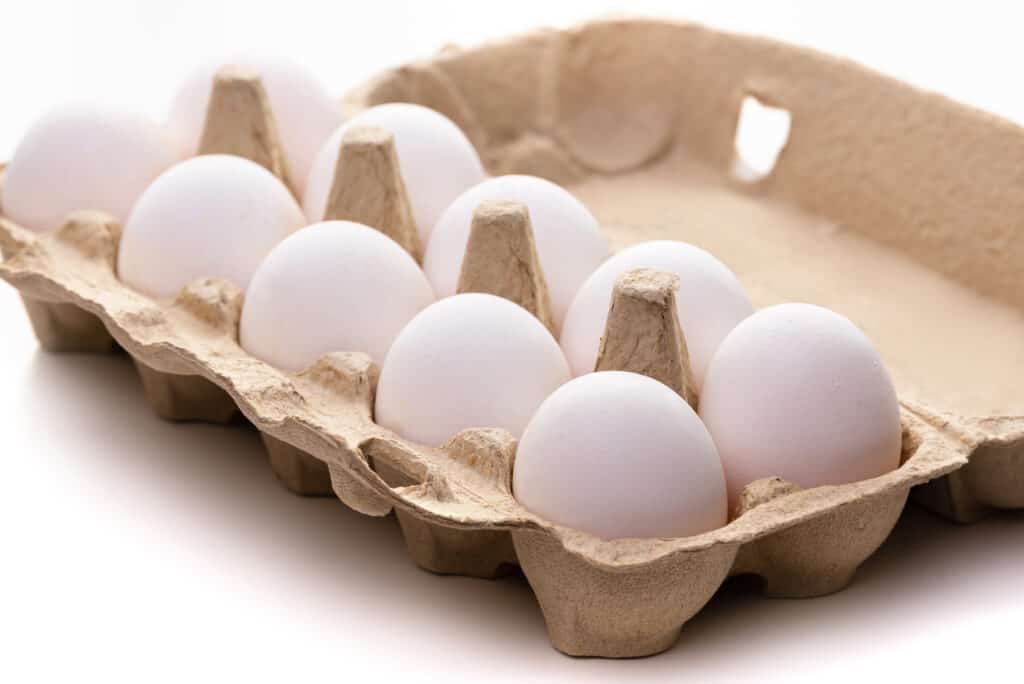
Many organizations, like America’s Department of Poultry Science, recommend refrigerating your eggs. However, many researchers believe that it doesn’t matter; eggs can be kept on the counter or in the fridge.
©Nataliya Schmidt/Shutterstock.com
The Average Number of Eggs Produced From One Hen
An exact number is hard to determine because chickens produce a different amount of eggs throughout their lifetime. For example, hens start laying eggs at around four to five months. At this age, they can produce an egg every other day and sometimes one a day. Hen’s usually reach peak productivity when they are two years old. This is when farmers usually retire their hens. However, chickens usually live to five years old, so if they no longer produce eggs, most farmers will slaughter them for meat.
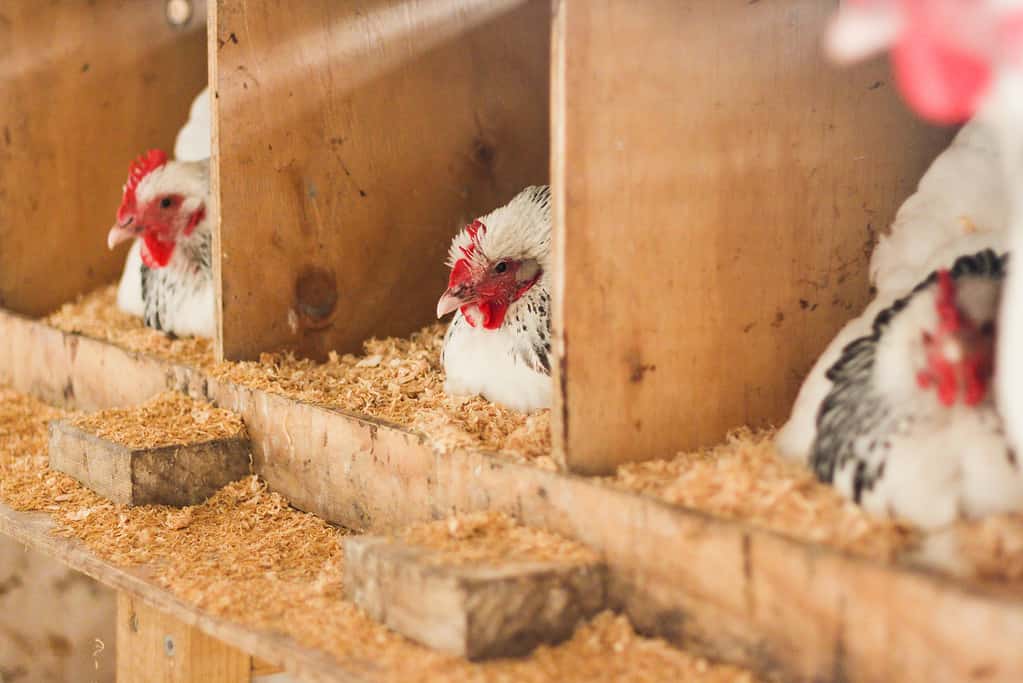
Hens start laying eggs at around four to five months. At this age, they can produce an egg every other day and sometimes one a day. Hen’s usually reach peak productivity when they are two years old.
©iStock.com/nedjelly
The photo featured at the top of this post is © Sea Wave/Shutterstock.com
Thank you for reading! Have some feedback for us? Contact the AZ Animals editorial team.






